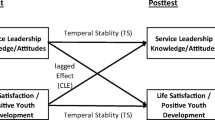Abstract
We provide an empirical investigation of leadership characteristics and social justice issues in the context of financial literacy service-learning. Using a unique dataset of student self-ratings, we find that students experience statistically significant increases in 8 of the 10 leadership dimensions and 7 of the 7 social justice issues examined in this study. Leadership dimensions include: persuasion, building community, “commitment to the growth of people,” stewardship, empathy, awareness, foresight, and listening. Interest in social justice issues include: dignity of the human person, community and the common good, rights and responsibilities, option for the poor, dignity of work, solidarity, and care for God’s creation. The statistically significant increases in these dimensions following the completion of the service-learning suggest positive effects on students’ self-perception of leadership qualities and interests in social justice issues: business school students sense improvement in nurturing growth of employees and colleagues, commitment to serving the need of others, understanding and empathizing with others, ethics, ability to foresee the likely outcome of a situation, and listening intently to others. As a consequence of the financial literacy service-learning, we believe that business students become more prepared toward becoming ethical leaders and citizens with compassion to serve the world for the well-being of all people, rich and poor alike.
Similar content being viewed by others
Notes
Ignatius University and the SERVE program are pseudonyms.
References
Cagle, J., & Baucus, M. (2006). Case studies of ethics scandals: Effects on ethical perceptions of finance students. Journal of Business Ethics, 64(3), 213–229.
Cavanagh, G.F. (2009). ‘What’s good for business? The ethical legacy of Catholic business schools. America, 20–22. http://www.americamagazine.org/content/article.cfm?article_id=11402&comments=1.
Cavanagh, G. F. (2010). American business values: A global perspective. Upper Saddle River: Prentice Hall.
Cornelius, N., Wallace, J., & Tassabehji, R. (2007). An analysis of corporate social responsibility, corporate identity, and ethics teaching in business schools. Journal of Business Ethics, 76(1), 117–135.
D’Aquila, J., Bean, D., & Procario-Foley, E. (2004). ‘Students’ perception of the ethical business climate: A comparison with leaders in the community. Journal of Business Ethics, 51(2), 155–166.
DeGraffenreidt, J.H., Dukes, C.M., & Sadusky, B.J. (2012). Washington Post. Retrieved February 2012, http://www.washingtonpost.com/opinions/yes-kids-need-to-learn-financial-literacy-but-we-cant-wait-till-high-school-to-teach-them/2012/02/01/gIQAH7spnQ_story.html.
Delbecq, A. L., Cavanagh, G. F., Haughey, J., Hendrickson, A., Stebbins, M., & Winkler, A. (2010). Higher education for business in the Jesuit tradition. Journal of Jesuit Business Education, 1(1), 119–123.
Greenleaf, R. K. (1977). Servant leadership: A journey into the nature of legitimate power and greatness. Mahwah: Paulist Press.
Joseph, E. E., & Winston, B. E. (2005). A correlation of servant leadership, leader trust, and organizational trust. Leadership and Organization Development Journal, 26(1), 6–22.
Kohls, J. (1996). Student experiences with service learning in a business ethics course. Journal of Business Ethics, 15(1), 45–57.
Locatelli, P. L. (2010). Advancing the common good: Does justice conflict with markets? Journal of Jesuit Business Education, 1(1), 77–84.
Lusardi, A., Mitchell, O. S., & Curto, V. (2010). Financial literacy among the young. Journal of Consumer Affairs, 44, 358–380.
Nemethy, L. (2012). Financial literacy, today’s Zaman. Retrieved February 2012, http://www.sundayszaman.com/sunday/newsDetail_getNewsById.action?newsId=271173.
Papamarcos, S. (2005). Giving traction to management theory: Today’s service-learning. Academy of Management Learning and Education, 4, 325–335.
Poff, D. C. (2010). Ethical leadership and global citizenship: Considerations for a just and sustainable future. Journal of Business Ethics, 93(1), 9–14.
Russell, R. F., & Stone, A. G. (2002). A review of servant leadership attributes: developing a practical model. Leadership and Organization Development Journal, 23(3), 145–157.
Seider, S., Gillmor, S., & Rabinowicz, S. (2011). The impact of community service learning upon the worldviews of business majors versus non-business majors at an American university. Journal of Business Ethics, 98(3), 458–504.
Sims, R., & Sims, S. (1991). Increasing applied business ethics Courses in Business School. Journal of Business Ethics, 10(3), 211–219.
Spitzer, R. J. (2010). The distinctiveness of Jesuit Schools. Journal of Jesuit Business Education, 1(1), 1–16.
Wittmer, D. (2004). Business and community: Integrating service learning in graduate business education. Journal of Business Ethics, 51(4), 359–371.
Zlotkowski, E. (1996). Opportunity for all: Linking service-learning and business education. Journal of Business Ethics, 15(1), 5–19.
Acknowledgments
The authors are grateful for the comments provided by the anonymous referees. In addition, the authors would like to thank participants at the Colleagues in Jesuit Business Education Annual Meetings (Los Angeles, CA, July 12–14, 2012) for useful comments and discussions. The authors would also like to thank the staff of the UDM Institute for Leadership and Service for compiling and providing the data. Omid would like to thank Michele Burton and Operation HOPE for coordination of the UDM Banking On Our Future Program.
Author information
Authors and Affiliations
Corresponding author
Rights and permissions
About this article
Cite this article
Sabbaghi, O., Cavanagh S. J., G.F. & Hipskind S. J., T. Service-Learning and Leadership: Evidence from Teaching Financial Literacy. J Bus Ethics 118, 127–137 (2013). https://doi.org/10.1007/s10551-012-1545-6
Received:
Accepted:
Published:
Issue Date:
DOI: https://doi.org/10.1007/s10551-012-1545-6




